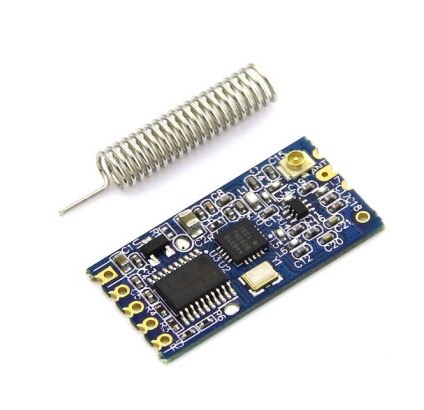Productos
HC-12 Wireless Transceiver Modules 433Mhz - 1000 Meters

Transceptor Inalámbrico - 433Mhz - 1000mts. Basado en el HC-12.
COD: SE800132001
Peso: 0.002 Kg
Disponibilidad: Sin Stock
ARS 26711.00
El producto no está disponible para la venta en este momento
Características
HC-12 Wireless Transceiver Modules 433Mhz – 1000 Meters
HC-12 Wireless Transceiver Modules 433Mhz are wireless serial port communication modules, It is based on SI4463 RF chip, it has built in microcontroller, and can be configured using AT commands, Maximum output power is 100mW (20dBm) and receiver sensitivity differs from -117dBm to -100dBm, depending on transmission speed. It accepts 3.2V-5.5V and can be used with 3.3V and 5V UART voltage devices (3.3V safe).
Each HC-12 can work in one of following modes:
1. FU1 – moderate power saving mode with 250000bps “over the air” baud rate. Serial port baud rate can be set to any supported value
2. FU2 – extreme power saving mode with 250000bps “over the air” speed. Serial port rate is limited to 1200bps, 2400bps, 4800bps
3. FU3 – default, general purpose mode. “Over the air” speed differs depending on serial port speed. The same goes for maximum range:
· 1200bps ~ 1000m
· 2400bps ~ 1000m
· 4800bps ~ 500m
· 9600bps ~ 500m
· 19200bps ~ 250m
· 38400bps ~ 250m
· 57600bps ~ 100m
· 115200bps ~ 100m
4. FU4 (available in version 2.3 or newer) – long range mode. “Over the air” speed is limited to 500bps and serial port speed to 1200bps. Because air speed is lower than port speed, only small packets can be send: max 60 bytes with interval of 2 seconds. In this mode range is increased to 1800m.
Pair of HC-12 that creates a wireless link has to work in the same mode (FU1, FU2, FU3, FU4) and with the same speed.
Configuration
HC-12 can be configured using AT command. The best way to do it, is to use USB-to-serial converter like CP2102. To put HC-12 into AT mode, pull SET pin to GND like this:
Most important commands:
1. AT – test command. It will return OK if AT interface is enabled
2. AT+Bxxxx – set serial port baud rate. For example, AT+B57600 set baud rate to 57600bps
3. AT+Cxxx – set radio channel. Channels start from 001 at 433,4MHz. Each next channel adds 400kHz. Channel 100 is 473,0MHz. AT+C002 will set frequency to 433,8MHz. Two HC-12 devices that creates a wireless link have to operate on the same frequency
4. AT+FUx – set device mode: FU1, FU2, FU3 or FU4. Two HC-12 devices that creates a wireless link have to use the same mode
5. AT+Px – set device transmitting power. For example AT+P2 sets power to 2dBm (1.6mW)
1. -1dBm (0.8mW)
2. 2dBm (1.6mW)
3. 5dBm (3.2mw)
4. 8dBm (6.3mW)
5. 11dBm (12mW)
6. 14dBm (25mW)
7. 17dBm (50mW)
8. 20dBm (100mW)
6. AT+RX – retrieve all parameters: mode, channel, baud rate, power
7. AT+V – retrieve module version
8. AT+DEFAULT – reset module parameters to default settings
Features
· Long-distance wireless transmission (1,000m in open space/baud rate 5,000bps in the air)
· Working frequency range (433.4-473.0MHz, up to 100 communication channels)
· Maximum 100mW (20dBm) transmitting power (8 gears of power can be set)
· Three working modes, adapting to different application situations
· Built-in MCU, performing communication with external device through serial port
· The number of bytes transmitted unlimited to one time
Specification
· Working frequency: 433.4MHz to 473.0MHz
· Supply voltage: 3.2V to 5.5VDC
· Communication distance: 1,000m in the open space
· Serial baud rate: 1.2Kbps to 115.2Kbps(default 9.6Kbps)
· Receiving sensitivity: -117dBm to -100dBm
· Transmit power: -1dBm to 20dBm
· Interface protocol: UART/TTL
· Operating temperature: -40℃ to +85℃
· Dimensions: 27.8mm x 14.4mm x 4mm


